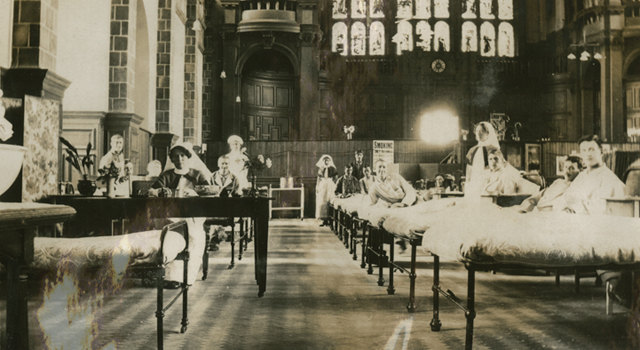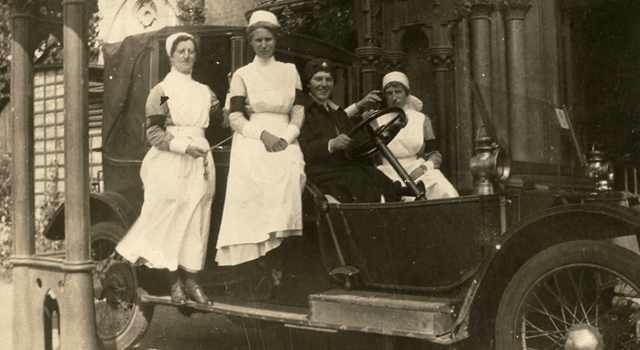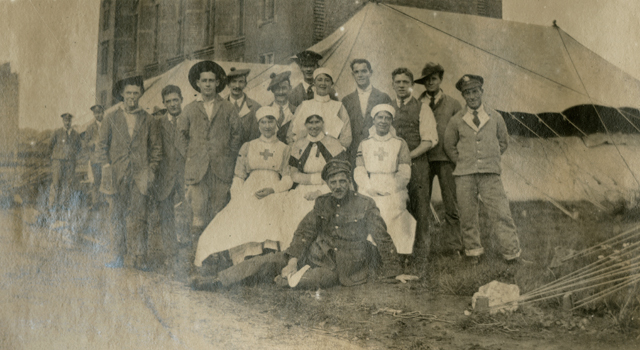Articles
32 Comments
By Voices
On 10, Feb 2014 | 32 Comments | In Cities | By Voices
Birmingham’s Military Hospitals
Library of Birmingham
www.libraryofbirmingham.com
Plans for military hospitals in Birmingham were made by the 13th Territorial General Hospital well in advance of war breaking out. Birmingham University was used as the 1st Southern General Hospital, with the first wounded soldiers arriving on 1 September 1914, and 1,000 beds provided by early 1915. As casualties increased many other buildings became hospitals, such as the Poor Law Infirmary on Dudley Road in 1915, the Monyhull Colony in King’s Norton in 1916 and school buildings in Kings Heath and Stirchley. Rubery Hill and Hollymoor hospitals were also used.
![Great Hall, University of Birmingham [Library of Birmingham: WW1/Hospitals]](http://www.voicesofwarandpeace.org/wp-content/uploads/2014/03/ww1-hospitals-1st-gs_p17a.jpg) Auxiliary hospitals, often staffed by volunteers, were set up in some of Birmingham’s larger houses, including Highbury in Moseley, Moor Green Hall, Harborne Hall, The Beeches in Erdington, Uffculme, and Allerton in Sutton Coldfield.
Auxiliary hospitals, often staffed by volunteers, were set up in some of Birmingham’s larger houses, including Highbury in Moseley, Moor Green Hall, Harborne Hall, The Beeches in Erdington, Uffculme, and Allerton in Sutton Coldfield.
When war broke out on 4th August 1914, mobilisation orders were received by the 1st Southern General. Just one week later, 520 beds were in place in accordance with plans drawn up in 1909. This photograph shows the University of Birmingham’s Great Hall converted into a military hospital ward.
Many activities were organised to keep the wounded and convalescing soldiers occupied. Workshops mended boots and produced surgical appliances, bed frames, supplies for the front. Classes were given in languages, shorthand, book keeping, shorthand, carpentry, tailoring and gardening. Drama companies put on shows and many Birmingham theatres provided free tickets to performances. At Christmas, wards were decorated and traditional celebrations took place.
![Ambulance at Highbury [Library of Birmingham: WW1/Hospitals]](http://www.voicesofwarandpeace.org/wp-content/uploads/2014/03/highbury-001c.jpg) Regular ambulance units could not cope with the numbers and volunteer drivers ferried wounded soldiers to hospitals and delivered medical staff to stations. Volunteers produced medical equipment and also trained as nurses. A Citizen’s Committee and Lady Mayoress’s Depot, set up in 1914, organised much of the voluntary work in the city.
Regular ambulance units could not cope with the numbers and volunteer drivers ferried wounded soldiers to hospitals and delivered medical staff to stations. Volunteers produced medical equipment and also trained as nurses. A Citizen’s Committee and Lady Mayoress’s Depot, set up in 1914, organised much of the voluntary work in the city.
Highbury opened as an auxiliary hospital in 1915, the money for its equipment being donated by Kynoch’s of Witton. It specialised in neurological cases and was staffed by a commandant, a matron, eight sisters and voluntary workers, mostly women. It had 274 beds, an open air ward, and the conservatories and greenhouses were used in emergencies.
This photograph, taken in the grounds of the Edgbaston military hospital, shows wounded soldiers from Australia and Scotland with other Allied patients and VAD nurses. By the end of the war there were over 7,000 beds in Birmingham and by 1919 over 125,000 men had been treated, including Belgian, American, and Serbian soldiers.
-
Hi, I’m trying to track down records for my grandmother who was a nurse at 1st birminham war hospital during ww1. Her name was Cecilia Rosalie Wilks. I’ve had no success trying to get her records through the national archives. I live in Australia so must do all this remotely. Hope you can help.
Many thanks
Dixie -
Hi! My name Lizz Bolton, I am a student studying at Rosemont College in Bryn Mawr, Pennsylvania, US. I am looking for a specific nurse that worked at “the 1st Southern General Hospital” during WW1. The nurse is known as Nurse Wilson. We have access to her autograph album. I was wondering if you have heard of this nurse or have any records of a nurse with the last name of Wilson (I’m sure there are many, seeing that it’s a very common name).
-
My aunt, Audrey Powell, was a VAD in 1914-18 War, and after 2 years in a Military Hospital in France,was sent jto 1st Southern General Birmingham for 6 months in 1917, and then to the Military Hospital, Kinmel Camp for a year and then to Shorncliffe Military Hospital. I have her service card, but wonder if more details of her service can be found.
Thank you for running your “help” page.
Regards Katharine-
Hi Katherine
I have photograph of a Sister Powell on my website under War Hospitals/1st Southern General Hospital Birmingham. Could this be your aunt?
913(1). Sister Powell. 1st Southern Military Hospital Birmingham
kind regards
Helen -
Hi Katharine
I have two photo’s of Sister Powell at the 1st Southern General Hospital on my website.
http://www.greyandscarlet.com
Could this be your Aunt?kind regards
Helen -
Hi Katharine
I think I may have a photo of you Aunt on my website.
Birmingham war hospitals, 1st Southern.
-
-
Please can you help I am trying to get any details I can of my Grandfather Ernest Williams he was in The Kings Royal Rifles and was injured at the Somme and I believe cared for at a military hospital in Birmingham he got married in Aston so as that is some way from his home town which leads me to believe he was in hospital there he had fingers or finger shot off thank you for any help you could give
-
Thank you for this site. My grandmother was a VAD at one of the hospitals in Birmingham during WW1. She nursed my grandfather, an Australian serviceman injured at the Somme in May 1917. They were later married and returned to Australia in 1919. When I made enquiries years ago, I was told that the records of the VAD service were destroyed during WW2, but you have mentioned other sources.
She was from Victoria St Harborne.
Any info, leads gratefully accepted.
-
Hello,
I am trying to trace Gertrude Headland who served as Clerk at th 1st Southern General Military hospital from 4/3/1918 to 29/4/1919. She was a VAD Red Cross volunteer. Do you have any photos, information or where I can find out a bit more.
Thank you Carole -
Interesting page. My Great-g grandmother Evelyn Alice Hall MBE) ran Stourbridge rest station/hospital where they fed, watered and then transported the troops onwards to 1st Southern general and Wordsley infirmary. I believe her husband also helped organise the transport from hospital train to the hospitals. Do you have any information on Stourbridge rest station/hospital?
-
Hi, i would be very grateful if you could give me any information about my great uncle William Knight who was sent to the hospital on the 14/5/1915 with a wounded right arm his army number was 2306
Hoping you will reply. -
Kerry
Your story is very similar to that o my grandmother, Ethel Mary (Effie) Rowcroft. née Withers who nursed an Australian Soldier Richard James Wellings and married him in Kings Norton in June 1917. They left for Australia in 1919 with three children:John Rowcroft from her first marriage, Doreen(my mother,known as Jill) and James Richard Wellings.Robert Sydney Wellimgs was born in Australia.
If we are related, then it must be through Uncle Jim who went back to Australia in 1949 and married, I think, Beverkey-
Hi Andrew
I’m James Wellings daughter Beverley. I found this site and your comment as I was searching for information regarding my dads WW11 history. I would love to get in contact with you to find out more information regarding the family. I hope you receive this message
Regards Bev
-
-
Kerry
Your story is very similar to that of my maternal grandmother, remarkably so. In fact so similar that I believe we are talking about the same people.
Ethel Mary – known as Effie – Withers was left a widow with a three year old son when her husband, George Rowcroft was killed in action in France in 1916.
While working as a VAD (Voluntary Aid Detachment) nurse in the 1st Southern General Hospital in Edgbaston (the district of Birmingham where she lived) she met and subsequently married a wounded Australian private, Richard James Wellings, whom she married in Kings Norton, in Birmingham on June 30th 1917. At the end of 1919, the family, now with three children (John Lawson Rowcroft (born 1913) Doreen (Jill) Wellings, my mother born 1918 and James Richard Wellings, my uncle Jim, born in 1919 and who returned down under in 1949 and whom I suspect is your father. Robert Sydney Wellings was born in Australia, I haven’t got his full details yet.
If my guesses are right, please get in touch with me as I have a lot more information on the family and James Richard Hobbs aka Richard James Wellings.
RegardsAndrew
-
Hi Andrew
We are not related. I have answered this email, but it has not appeared. There were approximately 8000 troops, wives and babies on the Demosthenes when it returned to Australia in 1919. Good luck in your studies.
Kerry -
Hi Andrew my grandfather is James Richard Wellings who is my grandfather my mum Beverly would like to Get in contact with you
-
-
Hi Andrew, my grandmother, Florence Helen Morgan of Harborne UK, was a VAD at 1st Southern General Hospital, Edgbaston. My grandfather was Thomas Henry Ford of Cassilis NSW. They were married February 1919 at St Peters Harborne. The Australian Government chartered a ship the Demosthenes to transport 8000 Australian troops and their wives and children back to Australia July 1919. Florence died having her 4th child in 1926. The child survived another 6 months. Sorry we are not related, but there were lots of people in this situation. I am sure Australia is the better for it.
-
Hi just wondered if you could direct me to finding out any photos or records relating to my grandad Joseph Kidd who was sent here from Egypt in WW1 and was nursed by his wife to be Gertrude Annie May Norman. Thank you in advance
-
Andrew Fearon
Hi, I’m obviously your cousin. My father was James Richard Wellings He died in 1991. I found out a lot of information regarding our grandfather Richard James Wellings from the Australian War Memorial records. and it does include his marriage certificate to Ethel Mary.
-
I wonder if you have any records regarding RAMC soldiers who served at Birmingham Dental Hospital in WWI? My grandfather Cecil Charles Lubbock lived in Pau in Southern France. He was a qualified dental surgeon having obtained his qualifications in Switzerland in 1908. On the outbreak of war he left his wife in Pau, (she had a Swiss passport), and came to England but there are no records until May 1918 when he was initially called up to No. 4 Camp, Squires Gate, Blackpool and finally transferred to the reserves in April 1919. He was fluent in English, German, Italian and French so are wondering if he may have been in intelligence in the first few years? His army number was 129200. Any information would be very welcome.
-
I’m currently researching ww1 autograph books and have one that refers to Fairoaks, Fircroft and Park House Edgbaston. There is no owners name in the book and I am following up clues from the contributors. The British Redcross list of hospital locations does not give these locations, neither can I identify any of the ladies in the books as being VADs. Any help would be gratefully received.
Kind regards
Rebekah -
Hi I’m researching my great grand-uncle William Straker who was sent to 1st Southern General Military Hospital in May 1917 I believe, but was definitely discharged on 16th February 2018. Two days later he married Amy Bonnick at St Bartholomew’s church in Edgbaston. On his discharge notice it states ‘disability aggravated by active service’. When he enlisted it is noted he ‘had large patch of ?ringwormorous scalp’. My Aunt advised that family history was he got an infection from a dirty razor and had bad reaction to his face (but not sure that would account for his possible long stay in Hospial). Please could you direct me where I might find his records for his stay in hospital. Thanks
Submit a Comment





![Commonwealth Patients in Edgbaston [Library of Birmingham: WW1/Hospitals]](http://www.voicesofwarandpeace.org/wp-content/uploads/2014/03/ww1-hospitals-1st-gs_p22.jpg)

Comments